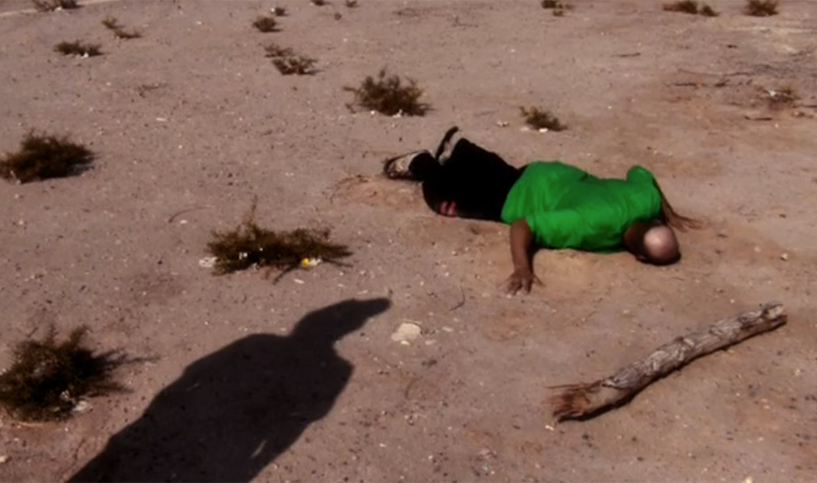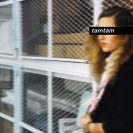By Nada Faris
Meqdad Al-Kout’s latest movie, Banana (2009), narrates the story of a married Kuwaiti man called Ahmad. Because of Ahmad’s martial discontent and his societal limitations, he asks a religious imam about the regulations of Temporary Marriage (Mut’ah). In addition to its controversial plot, the film contains frequent scenes and phrases that challenge the audience’s expectations. This created a rift between the public’s reception of the movie and the critics’. It was this rift that induced me to query the director over the characteristics of filmmaking in Kuwait and about his films in particular.
Al-Kout found that when it comes to movies, Kuwaitis are conditioned to appreciate pleasing settings, famous actors, linear plots, emotive climaxes, and cheerful conclusions. Audiences tend to classify their taste in genres so they attend categorical movies to mitigate the possibility of serious contemplation. They do so because they view the cinema’s function as a gateway out of their real experiences. The cinema acts as an orifice that leads to catharsis (mirth, sadness, love, etc.), not to cerebral deliberation. In Kuwait, a movie is a movie: it cannot be read, it does not need to be interpreted and it lacks value or symbolism—except when our Arabian/Muslim honor is questioned. Even if the movie does not vilify “our honor,” it will either drown in the vortex of a scandal (that may involve numerous boycotts and parliamentary feuds), or it will be dismissed and entombed in obscurity where it “deservedly” belongs.
Al-Kout’s Banana does not derogate the convention of Temporary Marriage. His surreal expression and chaotic organization denies the automatic escapism offered by Hollywood movies. This keeps the audiences on edge, never able to predict the following scene, never fully comfortable with the incongruous images they witness. This is demonstrated in one of the scenes where the protagonists (Nezar Al-Qandi) with his friend (Mousaed Khaled) sit together on a bench. After discussing a “logical guy” (Omar Al-Enezi) from afar, the following shot displays Al-Enezi lying on both their laps. Such a scene, without being symbolic of anything in particular, bears signification in context. Could it be that the characters were burdened by the same emblem of patriarchal logic? The author denies dictating a single meaning and the movie abnegates the deliverance of a primary message. It is this openness that frustrated some of the viewers. If Al-Kout is not slandering the convention, is he then mocking it? Anyone who watches the movie will find that none of its characteristics resemble comic traits. Instead of belittling the topic, the director emphasizes its gravity through his deployment of long still shots, sparse dialogue, a somber musical score and lugubrious characters.
This way of filming does not emerge from a stagnant philosophy; it develops from experience. Al-Kout’s filmmaking inception began at university when he collaborated with his colleagues on a heart-wrenching movie titled: Shards of Paper. He says, “I had been filming ever since I was a child. I loved to make people laugh, so I would record skits and show them to my family. But the first real project that I worked on with a professional attitude was Shards of Paper.” This movie, which he made for Kuwait University’s English Day at the Faculty of Arts, includes a melancholic atmosphere and disjointed shots analogous to Banana’s. It portrays the story of a young Kuwaiti man whose intellectual Westernization conflicts with his family’s traditional and narrow view of identity. Because Al-Kout administers the artist’s role with expositions rather than solutions, the audience at Kuwait University was divided. They all agreed that a tragic predicament required immediate attention. However, they couldn’t uniformly agree on its victim.
The positive reaction of his university professors and colleagues encouraged Al-Kout to venture into filmmaking as a career—and he excelled commendably. His first official project, The Beauty of Khaled’s Mind (2007), was selected for an official screening in each of the following festivals: Emirates Film Competition, Wahran International Film Festival in Algeria, Baghdad Film Festival, and Nabeul Film Festival in Tunis. Al-Kout’s critical acclaim amplified with his second movie, Paradoxes (2008), which was screened in both the Gulf Film Festival and Dubai International Film Festival under the section titled Gulf Voices. Al-Kout’s latest film, Banana (2009), has already won the Special Jury Award at Gulf Film Festival and was requested for an official screening in this year’s Dubai International Film Festival.
Dubai International Film Festival (DIFF) is indeed different from institutional festivals. It aims to advance cultural tolerance, understanding, and appreciation through the aesthetic medium of the cinema by exhibiting both creative and original films. Since its commencement in 2004, it has experienced a remarkable ascendancy in participants, audiences and patrons. This year’s festival will take place from the 9th of December until the 16th.
But then again, if you detest the avant-garde’s rejection of institutional art, you can always nip into The Palladium at Dubai to celebrate the Backstreet Boys concert which will take place on the 17th of December. I suggest you attend DIFF and then the BSB concert for art is multifaceted: it can both arouse solemn contemplation and stimulate emotions.
For more information about the author, please visit www.nadafaris.com.











